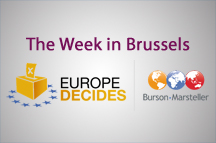 Spitzenkandidaten is one of the words of the moment in Brussels, and one that is giving British political parties a few headaches.
Spitzenkandidaten is one of the words of the moment in Brussels, and one that is giving British political parties a few headaches.
The concept of ‘lead candidates’ is familiar in Germany and many other parts of Europe. And it is now a key feature of this year’s European elections. For the first time, the new European Parliament will elect the President of the European Commission, based on a proposal from national leaders sitting in the European Council.
This is a big change from the behind-closed-doors deals of the past and a small but important step to making Europe more democratic. It is one of the main topics Burson-Marsteller Brussels is covering as part of our Europe Decides initiative.
European-level political families are putting up candidates who will lead their campaigns and be their candidates for the Commission presidency, heading the body that initiates and implements EU law.
Labour
 The Party of European Socialists – of which Labour is a member – has chosen Martin Schulz, the current President of the European Parliament. Schulz was elected last weekend by centre-left parties from across Europe, and has the backing of several prime ministers. He professes his wish to be the first ‘democratically-elected’ Commission President, rather that the victor of a back-room deal.
The Party of European Socialists – of which Labour is a member – has chosen Martin Schulz, the current President of the European Parliament. Schulz was elected last weekend by centre-left parties from across Europe, and has the backing of several prime ministers. He professes his wish to be the first ‘democratically-elected’ Commission President, rather that the victor of a back-room deal.
Labour’s leadership, however, chose the eve of the PES Congress to rain on Schulz’s parade, announcing that it would not support him. Fearing criticism if they back a pro-integration candidate, Labour buckled in the face of Euroscepticism. This is a blow for Schulz, who may need to votes of 20 or 25 Labour MEPs to win the presidency. It is also for British influence in European affairs – especially if the German eventually heads the Commission.
Conservatives
 The Conservatives also have a spitzenkandidaten problem. David Cameron is desperate to stop Schulz becoming Commission President, but doesn’t care for the Christian Democrat (EPP) or Liberal nominees either. Recent meetings with his German and Dutch counterparts have tackled this issue, with Cameron looking to bring in a ‘compromise’ candidate at the last minute.
The Conservatives also have a spitzenkandidaten problem. David Cameron is desperate to stop Schulz becoming Commission President, but doesn’t care for the Christian Democrat (EPP) or Liberal nominees either. Recent meetings with his German and Dutch counterparts have tackled this issue, with Cameron looking to bring in a ‘compromise’ candidate at the last minute.
The UK cannot block a nomination, as the decision is taken by a qualified majority decision. Cameron is thought to have an alternative if the Socialists win the election – the Danish PM, Helle Thorning-Schmidt (incidentally, the preferred choice of Labour, too) – as well as suggestions from the centre-right, such as IMF head Christine Lagarde.
The approach of both Labour and the Conservatives is seen by many in Brussels as slightly bewildering. Both have argued for a more democratic, transparent and open Europe, but are opposing the choice of a President by this more democratic (if imperfect) process.
At a European level, the Conservatives have set their faces against the whole process, arguing that there is no European ‘demos’ to justify the presence of Europe-wide candidates. A candidate emerging from a smoke-filled room may serve their immediate political interests, but it does nothing to boost the legitimacy of European institutions (perhaps a deliberate intention) - or to enhance Britain’s standing in the long run.
EPP Dublin
On Friday afternoon, the race for the Commission presidency begins in earnest, with the election of Jean-Claude Juncker (EPP) to face Schulz and Guy Verhofstadt, the Liberal former Belgian premier.
However, this could be a race where the crossing the line first is not enough. Haggling and horse-trading after the elections on 22-25 May are likely still to determine the outcome – a disappointing outcome for those who support these initial steps towards a more democratic and legitimate European Union.














